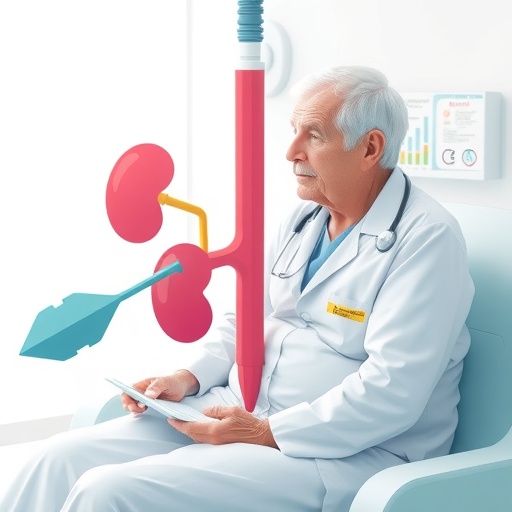Renal transplantation has increasingly emerged as a viable and often preferred treatment option for older adults suffering from end-stage renal disease (ESRD). With an aging population globally, understanding the nuances of this medical intervention has never been more critical. The updated review authored by Black, Romine, and Leeser highlights important considerations and evolving trends in renal transplantation for older patients. It delves into the timeline of advancements, the benefits, and potential risks associated with renal transplantation in this demographic group.
The review begins by examining the demographic shifts in the population, noting that the incidence of ESRD has risen significantly among older individuals. This trend has posed considerable challenges to healthcare systems worldwide. The aging kidney is uniquely susceptible to a range of diseases, increasing the likelihood of dialysis or transplant. Given these statistics, it is crucial for healthcare providers to reevaluate prevailing attitudes toward transplantation in older patients. Previously, the elderly were often deemed less suitable candidates due to assumptions about comorbidities, reduced physiological resilience, and perceptions of lower long-term survival rates.
The review goes on to discuss the advancements in surgical techniques and postoperative care that have made renal transplantation more accessible and effective for older adults. Minimally invasive surgical approaches, improved immunosuppressive regimens, and better patient management practices have all contributed to higher success rates. Consequently, the perceived risks of transplantation have been diminished, allowing more older individuals to receive kidneys from both living donors and deceased donors.
Furthermore, the authors emphasize the importance of careful patient selection. Although age is a significant factor, it’s not the sole determinant of transplantation eligibility. Comprehensive evaluations should include assessments of functional status, comorbid conditions, and psychosocial factors that could affect outcomes. Tools such as the Frailty Index are introduced as effective measures to help clinicians gauge an individual’s overall health and suitability for transplantation. This personalized approach not only enhances the likelihood of successful outcomes but also addresses broader quality-of-life issues for older patients.
Equally, the review addresses the significance of preoperative counseling and patient education. Patients must have a thorough understanding of what transplantation entails, including potential risks and benefits. Open discussions about organ donation, lifestyle modifications, and ongoing care are vital. Engaging patients in their care process fosters a sense of agency and may improve adherence to post-transplant protocols.
The authors also shine a light on the psychological and emotional aspects of renal transplantation in older adults. Patients often experience anxiety and depression related to their illness and the transplant process. Providing support systems, including psychological counseling and support groups, can significantly enhance patient resilience and improve recovery outcomes. The mental health of older transplant patients can be just as crucial as their physical health; many studies indicate that psychological well-being is positively correlated with post-operative success.
Moreover, the review highlights the impact of donor age on transplant outcomes. Evidence shows that older donor organs can be viable options for older recipients, contradicting previous beliefs that younger donated organs always yield better success rates. This shift in paradigm allows for a more inclusive approach to organ allocation and extends the possibility of receiving transplants to a broader spectrum of recipients.
As the review progresses, it addresses the importance of long-term follow-up and care for older transplant recipients. Ongoing monitoring for common post-transplant complications, such as graft rejection and infection, is crucial to maintaining kidney function and overall health. Additionally, regular assessments of cardiovascular health are essential, as older patients often exhibit higher rates of heart disease. Comprehensive care strategies must include not only medical monitoring but lifestyle modifications to mitigate these risks.
The growing body of research surrounding renal transplantation in older adults has also unveiled disparities in access to care and outcomes based on socioeconomic status and race. The authors call for urgent action to address these inequities in transplant availability and post-operative management. Initiatives aimed at increasing awareness and providing education within underserved communities can help mitigate these gaps and ensure that all patients receive equitable care.
In conclusion, the updated review by Black, Romine, and Leeser serves as a vital contribution to the ongoing discourse surrounding renal transplantation in older adults. By highlighting demographic shifts, advancements in surgical techniques, the importance of patient selection, and long-term care considerations, this review provides a well-rounded perspective on the subject. As the field continues to evolve, further research and collaborative efforts are essential to enhance the lives of older individuals affected by chronic kidney disease.
This critical exploration not only informs healthcare professionals but also empowers patients and their families to make informed decisions about renal transplantation. The continued advancements in this field signify a hopeful future for older adults grappling with the complexities of renal disease, allowing them to rediscover health and vitality in their later years.
Subject of Research: Renal Transplantation in Older Adults
Article Title: Renal Transplantation in Older Adults, an Updated Review
Article References:
Black, M.W., Romine, M.M. & Leeser, D.B. Renal Transplantation in Older Adults, an Updated Review.
Curr Transpl Rep 11, 153–159 (2024). https://doi.org/10.1007/s40472-024-00438-4
Image Credits: AI Generated
DOI: 10.1007/s40472-024-00438-4
Keywords: Renal transplantation, older adults, chronic kidney disease, donor age, patient selection, long-term care, healthcare disparities, psychosocial support.




